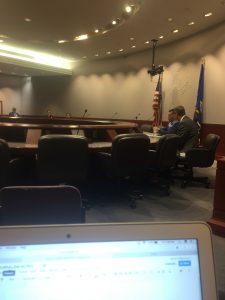Mark Ojakian, President of the Connecticut State Colleges and Universities system, is in charge of the oversight of over a dozen higher education students in the state of Connecticut (CSCU). On Friday March 3rd, 2017, Mark oversaw a committee meeting at the Legislative Office Building in Hartford, CT that discussed appropriations for the higher education institutes and services in the state. As he began the meeting, he outlined the leading issues that were to be addressed during throughout the meeting. Mark explained that the committee would be addressing problems ranging from the failure to reach the capacity of higher education enrollment in the state run Connecticut universities and colleges, to the overtime pay of custodial and janitorial workers at these institutes.
After a short discussion about how higher education students are too often working in fields that do not correspond with their majors and concentrations of study, Ojakian raised an issue that he found to be the most pressing of the day. “We have some real challenges,” remarked Ojakian as he introduced a topic of discussion that he claimed “bothered” him and made him “very concerned.” Ojakian was referring to the ratio of faculty advisors to students at Connecticuts higher education institutions. In his own opinion, Ojakian labelled these ratios as “unacceptable,” claiming that, especially in community colleges, advisors have the ability to understand the best path for them to graduation and beyond. Ojakian appeared personally invested in this issue in a manner that did not appear visible while he discussed the other matters of the meeting. This investment comes from his claim that academic advisors have the ability to “touch” their students, and create meaningful connections that will have significant impact on their academic careers.
In addition to guidance based on class choices and major requirements, members of the committee argued that advisors have the capability of helping low-income students achieve a four year degree in a more affordable manner by helping them move from 2 year programs to 4 year programs at a lower cost. Jane Gates, Provost & Senior VP Academic & Student Affairs, made a claim critical of the college preparation efforts of Connecticut high schools by claiming that “Many students coming to institutions are unprepared for collegiate work (CSCU).” The lack of academic advisors in the higher education system prevents individualized attention to students and makes efforts to help students plan for their degrees and careers much more challenging due to a lack of guidance. President Ojakian alluded to this lack of individual attention by highlighting how advisors are unable to serve in a strong mentor role for their students. He informed the committee that sometimes there are “people doubling as academic counselors and financial aid counselors.” Based on the opinions of the committee members at this appropriation work session, the lack of academic advisors in the higher education system is a serious problem that affects the guidance that students are receiving in achieving a quality education. Members of the committee pointed to advisors as a means of getting guidance on course choices, decisions about majors and concentrations, guidance on navigating the rigors of a college environment, and advice on how to make the most of their education at the lowest cost to themselves. While President Ojakian claims that these institutions are doing the best they can with the resources they have, there was wide support for an effort to bring appropriate funds to bringing in more academic advisors to create a better ratio of students to advisors.
Picture from inside Conference Room 1A in the Legislative Office Building as committee members began filing in for the Appropriations Higher Education Subcommittee Work Session with State Agencies
BIBLIOGRAPHY:
Connecticut Board of Regents for Higher Education. “Connecticut State Colleges and Universities.” Jane McBride Gates. CSCU, n.d. Web. 03 Mar. 2017.
Connecticut Board of Regents for Higher Education. “Connecticut State Colleges and Universities.” Mark E. Ojakian. CSCU, n.d. Web. 03 Mar. 2017.
